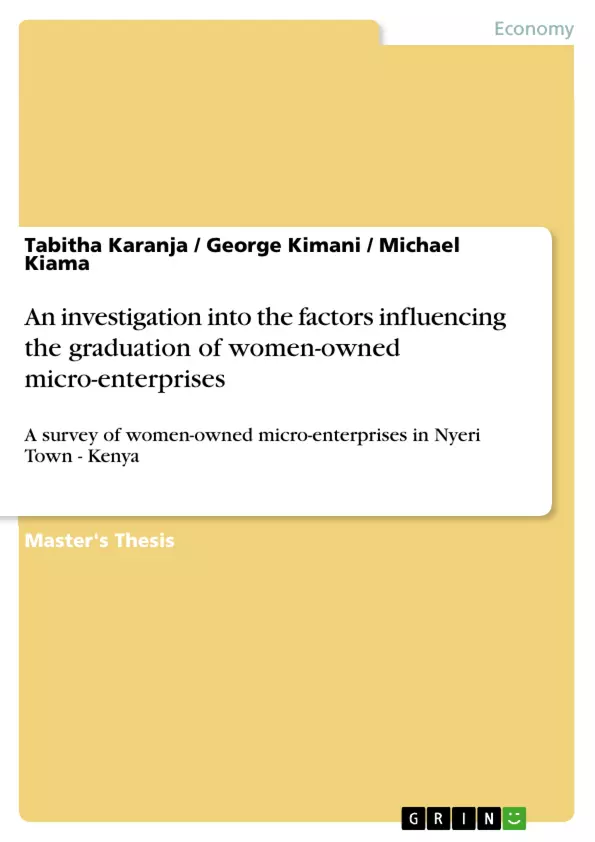The importance of Micro and Small Enterprises (MSEs) in contributing to job creation and output growth is widely accepted in both developed and developing countries, of particular interest is the process of expansion from micro to small that growth oriented
make their most tangible contribution to economic growth and job creation. .Women-Owned micro enterprises are a powerful force for growth and development thus making important contributions to the economy as workers and as entrepreneurs to the welfare of their
families. The researcher investigated why Women-owned enterprises remain the same way year in year out without, an increase in number of employees or any other sign to indicate graduation from one level to another. The researcher wanted to find out why enterprises owned by women operate under significant constraints which greatly inhibit
realization of their full potential. Many developing countries have attempted to put in place various intervention programmes to address factors that affect the graduation of women owned micro-enterprises; unfortunately many of them are policies yet to be implemented. Through the assistance from Nyeri municipal-council, the researcher
acquired the target population of Micro-Enterprises within Nyeri town which was the survey under study. The research design that the researcher used was the descriptive survey research design. Variables, for instance financial accessibility was looked at
among others and their influence on graduation of micro-enterprises. The instruments that the researcher used was the Questionnaire and Interviews. The researcher came up with comprehensive results that can be useful to women in micro-enterprises and the Government at large. Pre-testing procedure was carried out to ensure the validity and reliability of the data to be collected. A descriptive statistic procedure was used to carry out the data analysis. Bar-charts, tables and pie-charts are used for data presentation.
Some of the major findings in this research include the fact that many women operating micro-enterprises started their enterprises with personal savings as they could not access loans from formal institutions due to lack of collateral- Due to their low level of
education, majority of them exhibited challenges in record keeping as well as marketing which are very essential for graduation of an enterprise from micro to small.
Inhaltsverzeichnis (Table of Contents)
- CHAPTER ONE
- 1.0 Introduction
- 1.1 Research Background
- 1.2 Statement of the Problem
- 1.3 The purpose of the Study
- 1.4 The Objectives of the Study
- 1.5 Research Hypothesis
- 1.6 Significance of the Study
- 1.7 Research Scope
- 1.8 Assumptions
- 1.9: Definition of Terms
- CHAPTER TWO
- 2.0 Introduction
- 2.1 Theoretical Review
- 2.2 Entrepreneurship Theories
- 2.3 Empirical Review
- CHAPTER THREE
- RESEARCH METHODOLOGY
Zielsetzung und Themenschwerpunkte (Objectives and Key Themes)
The study focuses on examining the factors hindering the graduation of women-owned micro-enterprises from micro to small levels in Nyeri Town, Kenya. The researcher aims to identify and analyze constraints faced by these enterprises, exploring how they prevent these businesses from achieving growth and contributing fully to the economy.
- Financial accessibility and constraints on accessing capital
- Impact of education levels on business management skills and record keeping
- Technological challenges and access to internet and e-commerce tools
- Impact of government policies and intervention programs on enterprise growth
- Analysis of the potential for micro-enterprises to graduate and contribute to economic development.
Zusammenfassung der Kapitel (Chapter Summaries)
Chapter One: Introduction
This chapter provides an overview of the research background, highlighting the significance of micro and small enterprises in economic growth, particularly for developing countries. It establishes the problem statement, focusing on the barriers preventing women-owned micro-enterprises from graduating to larger scale operations. The chapter also outlines the study's purpose, objectives, research hypothesis, significance, scope, assumptions, and definitions of key terms.
Chapter Two: Literature Review
This chapter delves into the theoretical and empirical literature related to entrepreneurship and the factors influencing the growth of micro-enterprises. It examines relevant theories, including entrepreneurship theories, and explores existing research findings related to the challenges faced by women-owned businesses.
Chapter Three: Research Methodology
This chapter outlines the research methodology employed in the study. It describes the research design, target population, data collection methods, and data analysis techniques used to investigate the research questions.
Schlüsselwörter (Keywords)
This research examines the factors affecting the graduation of women-owned micro-enterprises in Nyeri Town, Kenya, focusing on issues such as financial accessibility, education levels, technological access, government policies, and the potential for growth and economic contribution. This study investigates the role of these factors in hindering the growth of micro-enterprises and explores strategies to overcome these challenges.
Frequently Asked Questions
Why do many women-owned micro-enterprises fail to grow?
Key barriers include limited access to formal credit due to lack of collateral, low education levels affecting record-keeping, and inadequate marketing skills.
What role does financial accessibility play in business graduation?
Financial access is crucial for scaling. Many women rely on personal savings because they cannot meet the requirements of formal banking institutions, which inhibits their potential to expand.
How does education impact these micro-enterprises?
Lower education levels often lead to challenges in professional management, such as poor financial documentation and limited use of modern technology or e-commerce.
What was the focus area of this research?
The study was conducted in Nyeri Town, Kenya, focusing on micro-enterprises within the municipal council's jurisdiction to identify growth-inhibiting factors.
How can government policies help these businesses graduate?
The research suggests that implementing existing intervention programs and creating policies that facilitate easier credit access and business training are essential for economic development.
- Quote paper
- Tabitha Karanja (Author), George Kimani (Author), Michael Kiama (Author), 2011, An investigation into the factors influencing the graduation of women-owned micro-enterprises, Munich, GRIN Verlag, https://www.grin.com/document/189232



